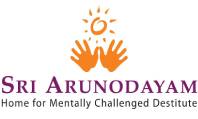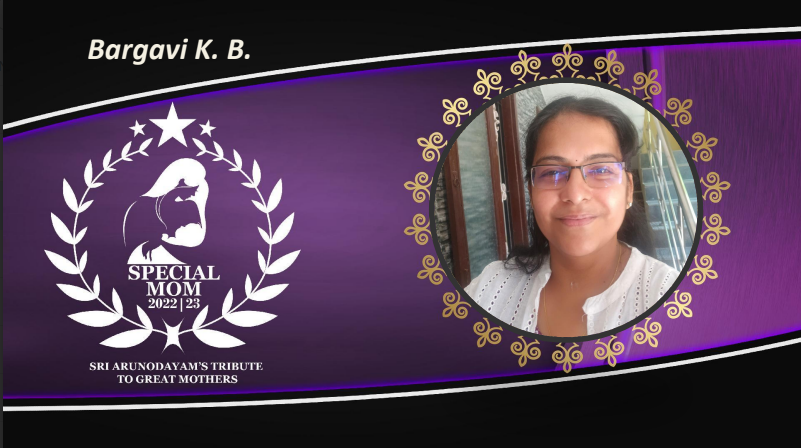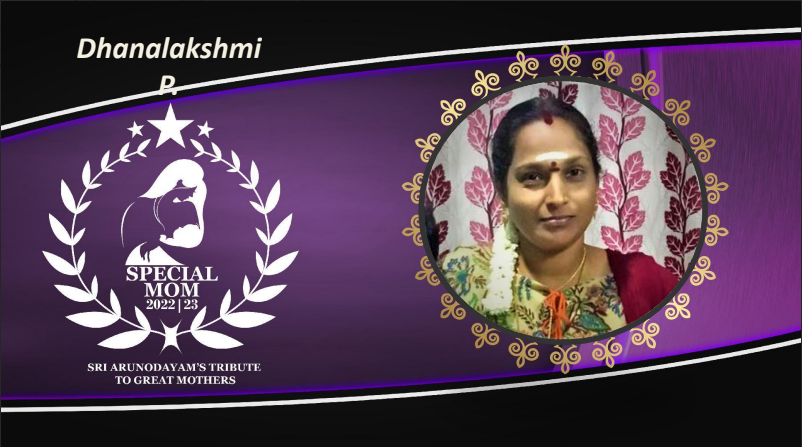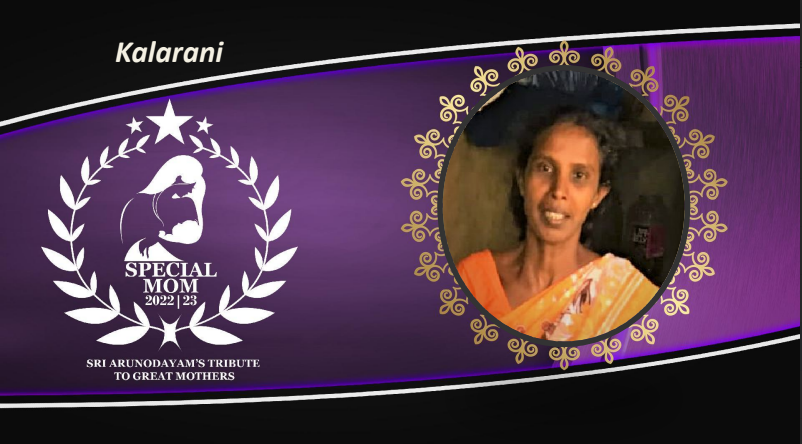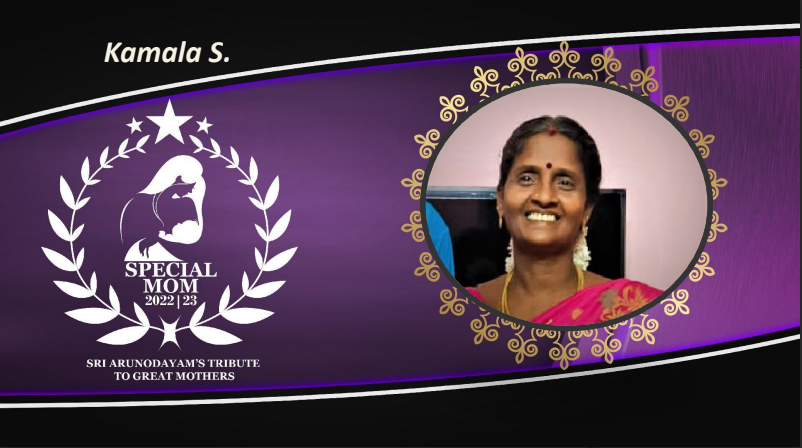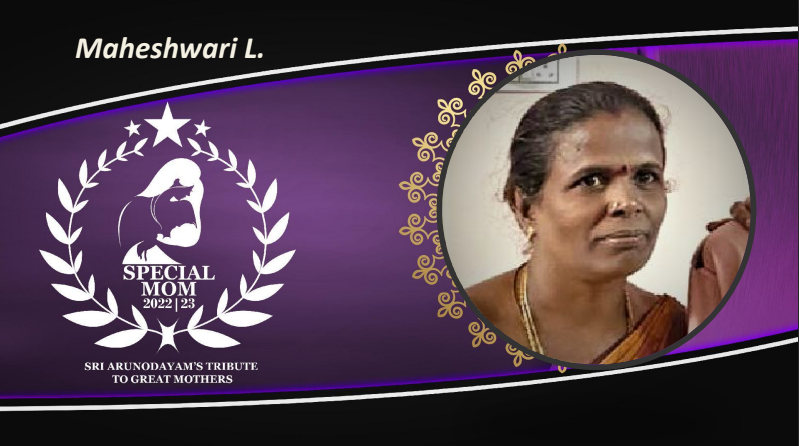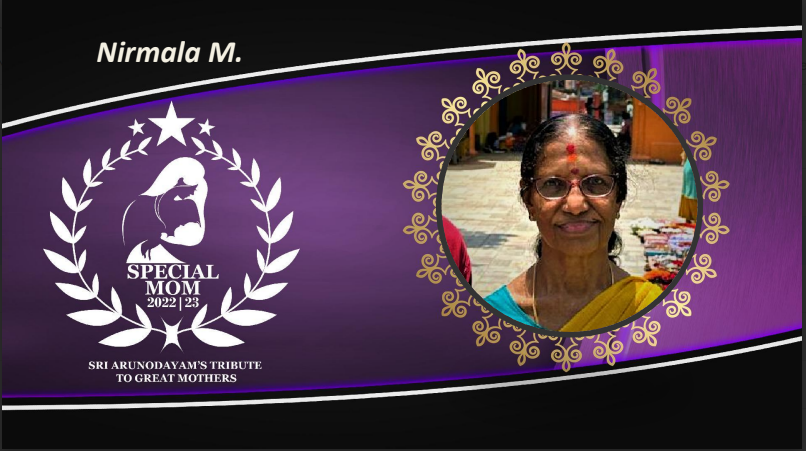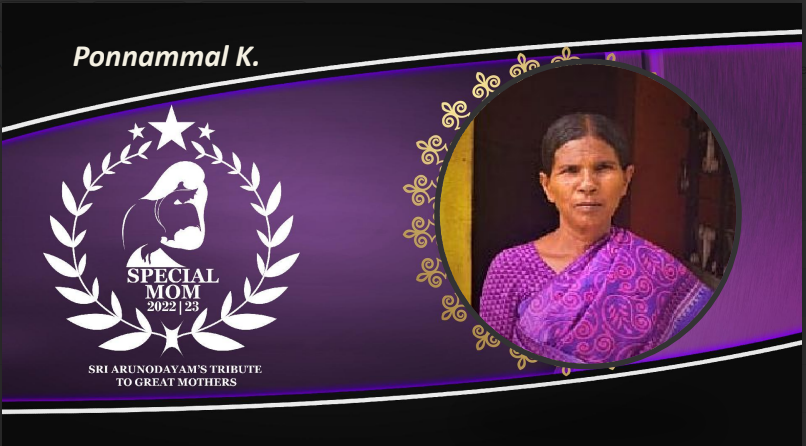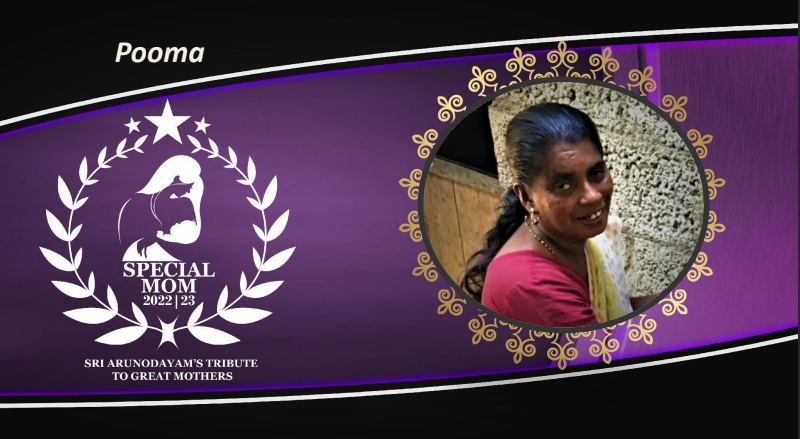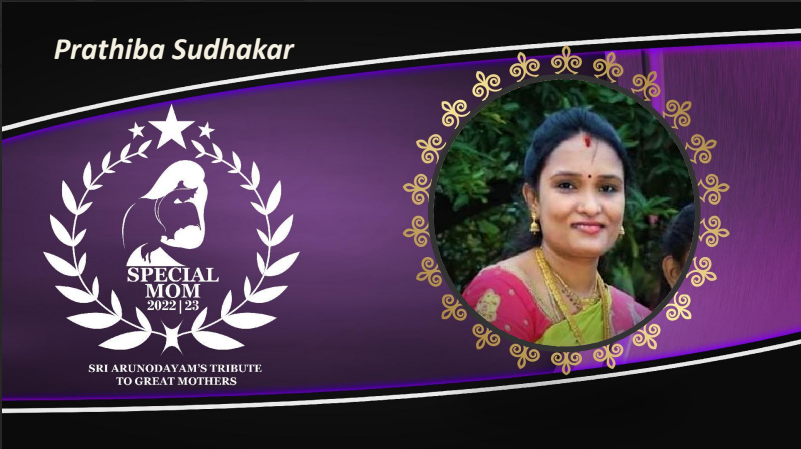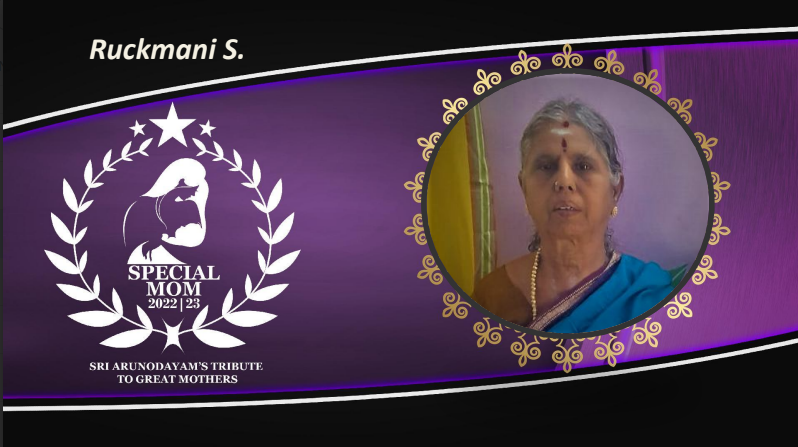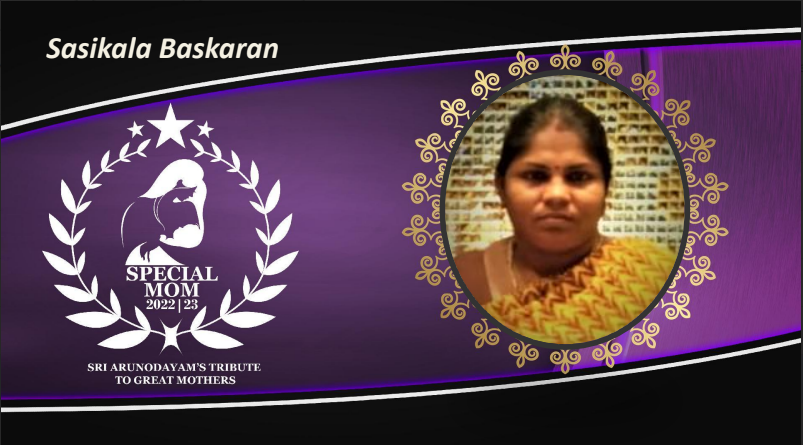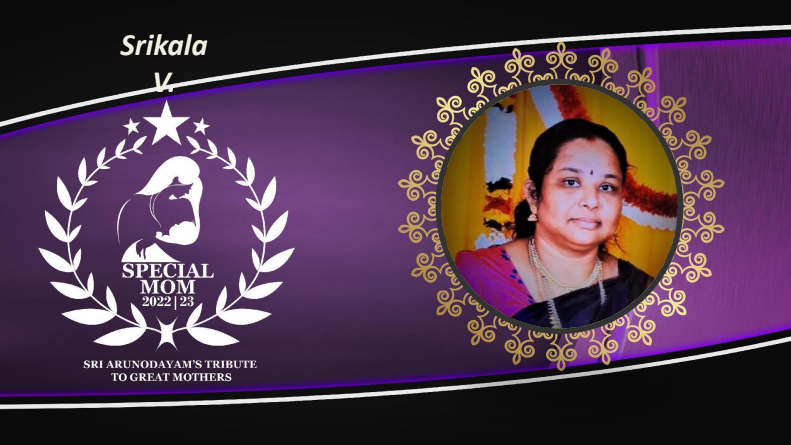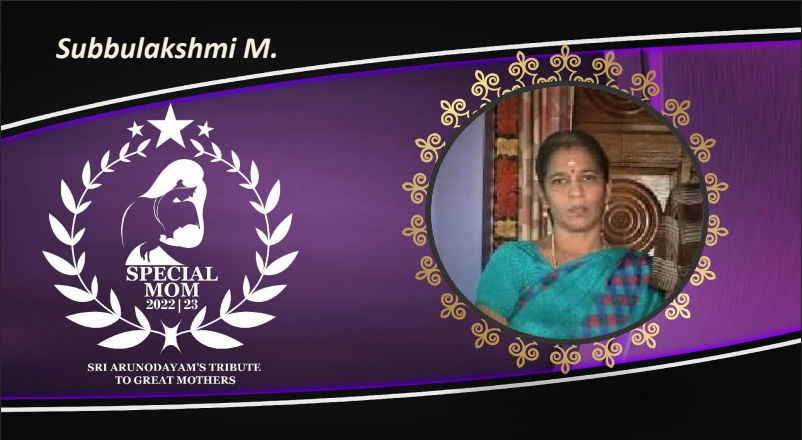2022 - 23 SPECIAL MOM STORIES
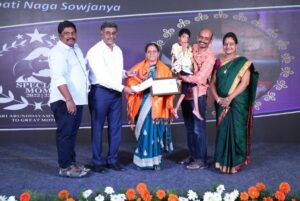
Alapati Naga Sowjanya
Alapati is not one to take things lying down. She speaks her mind. She is mother to ten-year old Tejasvi, a very talented differently abled girl. Tejasvi entered the India Book of Records in March 2022 for floating on water for the longest time. Yet, she lives with microcephaly, cerebral palsy and autism! Tejasvi proves that she can do anything she sets her mind to. She is an inspiration to many families in her community. Her own family looks upon her as a blessing.
Alapati says to anyone who cares to listen, “Don’t assume that children with intellectual disabilities are a result of the family’s karma or past deeds. This is a very wrong way of viewing things. These children are beautiful of soul and wonderful creations of God. They have been set apart to show humanity how to practice love and total acceptance.” Alapati doesn’t take kindly to pity. “Don’t pity us. We don’t need it,” she says. “I’ve learnt things from my daughter that I could never have learnt in any school. We try to enjoy every moment together. Isn’t that what an abundant life is about?”
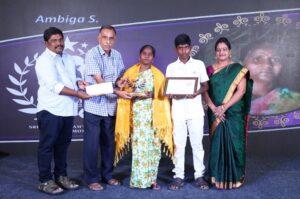
Ambika S
Ambika lives in Tiruvannamalai with her three children. Her husband deserted them around ten years ago. She’s been raising her boys on her own. Her eldest son is a welder and her youngest has just completed the 12th Standard. He has applied for higher studies in a Government College. Surender, the son in between these two, is a youngster with special needs.
Ambika is a daily wage earner. She works in multiple places to support her children. At present she works as a domestic help in a naturopathy center called Soul Free. “We don’t have the means to stay in a better place than this dilapidated log house at the moment,” she says. “But someday things will change. Someday, we will have overcome these challenges and made something of our lives. In the meanwhile, we do what we must to survive, and we work towards our dream of better days.”
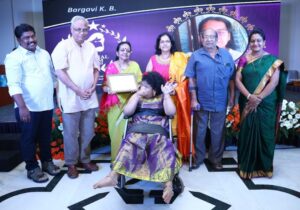
Bargavi K. B
Bargavi and her intellectually disabled daughter, Lhamaya, live with her parents in Madambakkam, Chennai. Bargavi had a bad marriage and her husband used to persecute her mercilessly on account of Lhamaya. The marriage lasted all but six years! Though her husband deserted her, Bargavi’s parents opened their doors to her. For the past 12 years, Bargavi and Lhamaya have been living with her parents. Together, they have rehabilitated the child as best as they could.
“Lhamaya basks in the love and acceptance of her grandparents. I believe she is alive and well today on account of this unconditional love,” says Bargavi. “We accept her as God’s special gift to us. We never isolate her in shame because there is nothing to be ashamed about. She receives all the support she needs and we try to create a happy environment for her with family and friends.”
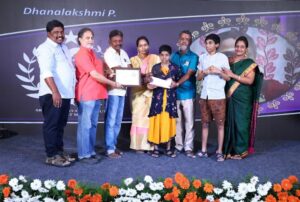
Dhanalakshmi P
Dhanalakshmi and her husband live in Coimbatore with their two children – Logeshwari and Jai Balaji. Although Logeshwari was diagnosed with severe intellectual disability, she can speak quite well. She learned to read and write, and she walks with support. Logeshwari had a heart valve replacement surgery from which she recovered but she has many health issues. She suffered with dengue and has frequent episodes of fits for which she is on medication. Jai Balaji too is a special child. He is autistic. His parents taught him to do everything on his own.
“My children are my eyes. They provide me with a deeper understanding of life and of what really matters,” says Dhanalakshmi. “I am lucky to have a supportive, understanding and patient husband. Together, we work to give our children the best. As a family unit, we lack nothing because we are there for each other, and that’s the most important support structure we need.”
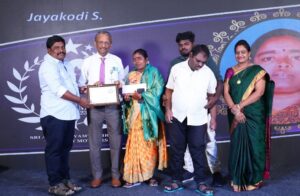
Jayakodi S
Jayakodi and her husband have two children. Her husband is retired, a heart patient with diabetes. Their elder son, Satish Kumar, is intellectually disabled. He needs complete hands-on care as he cannot do much on his own. He also suffers with seizures. Family members advised Jayakodi to put Satish in a home but she is not one to entertain such talk. She takes him everywhere, including festival celebrations and marriages. “What’s most important to me is my son’s happiness,” Jayakodi says. “I don’t care how people perceive me or my family. I will never desert them.”
Satish’s disability went undetected in the initial years. The family were cheated by a doctor who claimed to be able to cure Satish. Jayakodi sold her jewelry to be able to afford the “treatment” but it turned out to be a hoax. She then enrolled Satish in a school for the differently abled in Taramani, Chennai where he underwent physiotherapy for around 3 years. “The community isn’t really an ally,” says Jayakodi. “We struggle to rent a decent home due to Satish’s condition, which is quite visible. But I don’t give up easily. Despite my own health issues, my family will always come first, especially, Satish!”
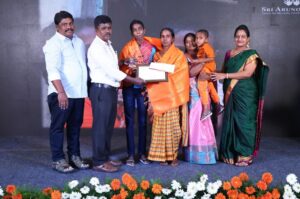
Kalarani
Not having registered her marriage, Kalarani was at the receiving end of much abuse from her husband. He sent her out of the house when she became pregnant with their first child, Abhinash. Her husband went abroad , leaving mother and child to fend for themselves. At some point in time, he returned and wanted to live as a family again. Although Kalarani didn’t want to go back to him , her brother forced her to. Kalarani became pregnant for the second time. The family went to Nagercoil where they were deserted yet again! Unable to trace her husband, she finally reached her mother’s home with the help of some good people. Her second child, Santosh Abhi, was intellectually disabled as well. He is also hyperactive. Kalarani doesn’t keep good health. Her younger brother too, is intellectually disabled and alcoholic. And so the cycle of abuse continues with her brother now abusing her.
“I’m here at my mother’s place because I can’t afford to take a house on rent and care for my two sons. I’m not able to take the violence and abuse anymore,” Kalarani says. “I am working on the 100 day work scheme introduced by the government and I support my elderly mother, younger brother and two sons on the meager allowances we receive. But I cannot help feeling worried when I think of my children’s future.”
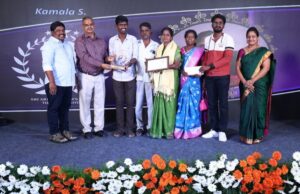
Kamala S
Kamala lives in Tambaram, Chennai. She has two sons. Her second son, Gautaman, is differently abled. Kamala had noticed that he was a bit different from the other children and he could not speak until he was four years old. He also seemed to be hyperactive. “Despite my problems, my mother taught me everything,” Gauthaman says. “I can do household chores such as drying and folding clothes, washing dishes, feeding the chickens, watering the plants, cycling, and so much more!,” he says proudly. Kamala enrolled Gauthaman in a Vocational Training center at Guindy where he receives speech and occupational therapies. He has made good progress.
“I’ve trained my son to be independent. I don’t want him to rely on anyone,” Kamala says. “He’s perfectly capable and needs minimal help. I’m even training him to cook and manage a home. He’s a quick learner and I know he’ll do okay.”
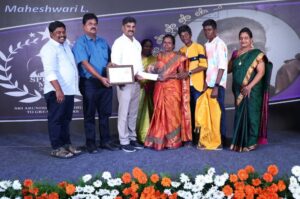
Maheshwari L.
Of her two children, Maheshwari’s second son, Surya Prakash, lives with autism. Thanks to Aparna, a pediatrician who first alerted Maheshwari to her son’s condition, she was able to get Surya into rehabilitation therapy fairly early. Aparna had noticed that Surya was autistic as early as when he was 18 months old! She immediately began therapy with him. At one time, Maheshwari had to pawn an item for Surya’s treatment as her husband found it hard to make ends meet as a laborer. People in Maheshwari’s town made fun of the child but she is not one to back down in defeat. Although the family still struggles, Surya is in the 8th standard at Star Special School today. He is an avid sportsman and is currently learning to ride a bicycle on sponsorship from Spread Love Foundation.
“I’m so emotional when I think of Surya. There’s so much goodness in him and yet, at one time I was angry with God for giving me a special child. I really regret thinking like this,” Maheshwari says. “I hope to give Surya a status in society, and I’m determined to bring him up to become a blessing to others around him. I believe he will.”
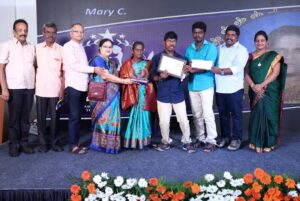
Mary C
Mary is 52 years old. After her marriage she moved from Kovilpatti to Chennai. Mary has three children; two boys and a girl of which her first born son, Shashi Kumar, lives with intellectual disabilities. Her second son is a graduate working in a private hospital. Her youngest, a daughter, is married. Shashi Kumar couldn’t walk or talk and at 12 years old suffered a nervous breakdown. His left leg was severely affected. Mary’s husband was initially supportive but he later separated from the family. Mary enrolled Shashi Kumar at NIEPMD and he received speech and other therapies including training in Sports for almost 12 years. Shashi is now 29 years old and learning photocopying and printing.
“My second son supports our family but I can’t help worrying about Shashi’s future,” Mary says. “Shashi needs constant care and attention. I know it is a difficult responsibility for any sibling who has his or her own life to live and that’s why I’m training Shashi to become independent.”
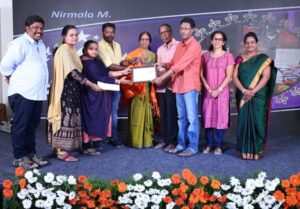
Nirmala M
Nirmala dotes on her son, Anand. When the child was in the First Standard, his teacher noticed that he had some learning difficulties. She told Nirmala about it. Not wasting a moment, Nirmala took Anand to NIMHANS Bangalore for a complete assessment. The observation was that Anand’s IQ was below 60. In addition, he suffers with epilepsy since childhood and remains on medication. Thus, Anand’s dream of attending a regular school was destroyed. Nirmala decided to move from Kerala to Chennai to seek a better system of education for her son. Anand went from organization to organization and finally ended up at the Spastic Society. Through this journey, he managed to complete his 10th and 12th Standard examinations through the National Institute of Open Schooling (NIOS). After this, they discovered NIEPMD where Anand was trained in adult independent living (AIL) for around 8 years.
“Seeing Anand’s capabilities, NIEPMD placed him in Rajas Dental Institution as an office support staff for three years, but the pandemic completely disrupted our lives,” Nirmala says. “Anand has nothing on hand to keep him occupied. I’m searching for a job where people would be understanding and treat Anand kindly and respectfully. As yet, I’ve not found one.”
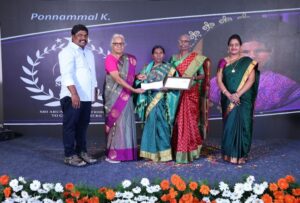
Ponnammal K
Ponnammal is 50 years old. She has four children. Her first two boys are doing well, but the last two children are differently abled. Her third child, a girl called Epsiyammal, isn’t able to speak or walk. Though Epsiyammal has developmental delay she has studied up to the 5th Standard. She is hyperactive and restless. She also has an eating disorder. Although Epsiyammal is 26 years old today, she looks like 15! The fourth child, a boy named Prabhukumar, appeared to be normal in childhood and even studied up to the 5th Standard. But mobility problems began to show up. He kept knocking into things and preferred to sit rather than walk. Prabhukumar was diagnosed with muscular dystrophy. His muscles became weak and the doctors insisted that he get therapy. Prabhukumar received therapy but the family could not afford to continue the treatment. So, he and Epsiyammal remain at home.
“As a family we feel really sad that we are unable to provide the therapies that Epsiyammal and Prabhukumar so badly need, but we can barely make ends meet, and we don’t have support from our relatives,” says Ponnammal. “Everyday I pray that God gives us the good health to be able to care for these children. A little more understanding from our relatives and community could help families like us go a long way!”
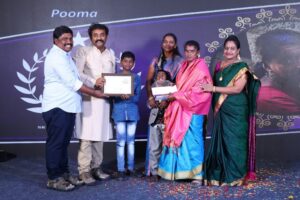
Pooma
Pooma has two children. Both are differently abled. Pooma’s husband is very irregular at work and gets home drunk everyday. Then he beats her and the children or sometimes ignores them for extended periods of time. Life is indeed miserable for this little family. Pooma’s first born, Regine Raj, is 14 years old but he looks like he’s 7. He’s undernourished and does not talk to anyone. Her second son, Reju, studied up to the 5th Standard. Then his class teachers began to notice some learning disabilities. Pooma put him in a special school, deeply hurt by the teachers’ insensitive feedback that “he is a bad influence on the other children”. Pooma struggles to bring up her two children with no proper income. She has health issues and a stomach tumor.
“Surgery is unlikely as none of our relatives are coming forward to help,” Pooma says. “My tumor is getting larger and I can’t bear the pain sometimes. My husband drinks away the special allowance I get from the Government for these children so I’m not able to give them nutritious food. But I am so grateful to the special school that takes good care of them. Life is very hard for me but I count my blessings every day. It helps keep me going.”
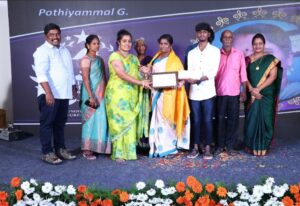
Pothiyammal G
Pothiyammal lives in Thiruvanmiyur. She has two sons of which the second one, Pothiraja, is a child with special needs. Pothiraja was diagnosed with autism a few years after he was born, so Pothiyammal and her husband moved to Chennai to get better treatment for him. Pothiraja received therapy from NIEPMD three days a week and attended the Government school two days a week. This arrangement worked well and he made good progress. Pothiyammal’s husband owns a small box store but he tends to drink away more than half his income. So, Pothiyammal is forced to manage their home, the education of her first son who is in college, and Pothiraja’s therapies with what he gives her.
“It is expensive to put a child through college these days. Trying to supplement my husband’s income, I work as a domestic help in a couple of houses. I also took a loan and bought a Thonnai machine through which I get additional earnings,” Pothiyammal says. “I’m training Pothiraja to operate it too. Learning a trade is always beneficial for children with special needs. It ensures that they become independent, which is always a good thing. It’s what I want more than anything for Pothiraja.”
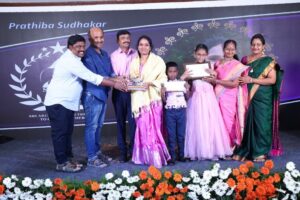
Prathiba Sudhakar
Prathiba is a HR professional with a Masters degree in social work. She always dreamt of having a daughter and watching her become someone special. So, when Roshini was born, it must have been a shock. Roshini struggles to see and to walk because she has choreoathetoid cerebral palsy. “As a mother working in a reputed corporate shared services company, it was impossible to do justice to both my job and my child. I had no choice but to stay home for Roshini,” Prathiba says. With the help of multiple therapists, Roshini began to walk for short distances. Gradually she became capable of handling herself and developed bladder control and self-toileting and cleaning skills. Roshini loves to sing. She’s quite adept with the phone or computer. “When faced with rejection, we are presented with a choice to explore other avenues,” Prathiba says. Prathiba, her husband, and their son Darush, put Roshini’s long-term goals on priority.
“I’m blessed to have their support. Without this, it’s an uphill and exhausting climb,” Prathiba says. Roshini is in the 5th Standard and she has a regular regimen that includes exercise, yoga, drawing, and other activities. “I dreamt of a different life for my daughter … but I’m proud to be the mother of a special child. More than anything, we need respect and to be treated with equality,” she says.
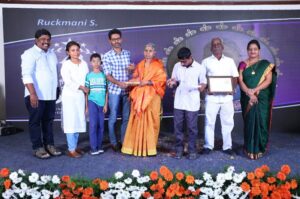
Rukmani S
Rukmani and her husband were childless for the first 10 years of their marriage. Then, Lokesh Babu was born. The couple lavished him with love. As he grew, something didn’t seem quite right but the diagnosis of intellectual disability shocked the couple. Rukmani was distraught, wondering why God had set up this challenge for them. Despite these troubling thoughts they set about doing what they could, and Lokesh Babu was sent to NIEPMD for therapy. He made good progress and is independent to a certain degree. At present, Lokesh Babu is training in manufacturing rubber bat plates at the National Institute for Empowerment of Persons with Multiple Disabilities (NIEPMD), Chennai.
“I’m 62 years old and my husband is my tower of strength. I don’t know what I would have done without him. But what’s going to happen once we’ve passed on? Who will support our son? That’s my primary concern,” Rukmani says. “In families where both normal and special children coexist, we make the mistake of paying less attention to the development of the challenged child. We must take care to provide both with the support they need to become the very best version of themselves.”
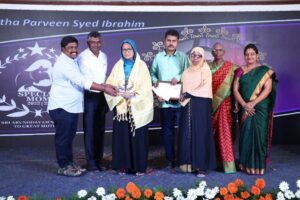
Sajeetha Parveen Syed Ibrahim
Sajeetha and her husband are parents to an only son, Sheikh Alauddin. He is the apple of their eye. The boy was normal and studied up to the 10th Standard. He was very active in school, taking part in debates, sports, and essay, poetry recitation and other competitions, winning many prizes and awards. Due to two bike accidents in succession, Sheikh Alauddin’s brain was badly traumatized and the damage appears irreversible. He suffers with terrible mood swings and only music seems to be able to calm his soul.
“I sought the expertise of a mental trainer and my son is responding very well to this form of training,” Sajeetha says. Sheikh Alauddin is very talented in handicrafts, which the family sells for a living. He is actively supported by his mother. “My husband too had an accident and he is paralyzed. He’s unable to stand up or walk,” Sajeetha says. “I try and find ways to make ends meet to keep our family going. My son and I are dong all we can to keep poverty from entering the door. I’m deeply concerned for the future of my son and husband,” says this 55 year old mother.
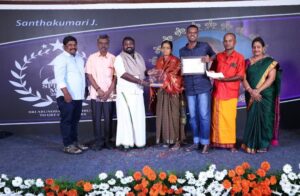
Shanthakumari J
Shanthakumari lives in Madurai with her husband and son, Sabrinathan. The child is intellectually disabled. Sabrinathan had been undergoing training at the Madurai M.S. Chellamuthu Centre but had to discontinue for almost two years due to the pandemic. His mother continued training him at home, and today, he’s able to take care of himself. Sabrinathan helps his mother prep the vegetables, cook, wash and dry clothes, and do a good bit of household work. Her husband used to work in a mill in Madurai but met with an accident around 10 years ago. He voluntarily retired from service.
“I sell trinkets and jewelry and use the income to run my home,” Shanthakumari says. The couple are delighted with their son’s progress. He studies well and is an observant child. “Unfortunately we cannot depend on our relatives to help us,” Shanthakumari says. “We decided not to have more children once we realized the Sabrinathan is intellectually disabled. We want to give him our full attention and help him become all that he can be.”
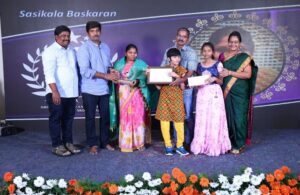
Sasikala Baskaran
Sasikala and her family live in Avadi, Chennai. She has 3 daughters. Raghabharati, her second daughter lives with intellectual disabilities. The child suffered with convulsions and high fever when she was just 10 months old and the treatment continued for a couple of years. Raghabharati was admitted to Avadi Palavihas School. She often falls ill. In 2019, she was an inpatient at Egmore Children’s Hospital for over 20 days due to the recurrence of seizures. Not getting proper help there, the couple moved her to Ramachandra Hospital where her lung was damaged due to negligence in fitting a feeding tube. So a PEG tube was inserted through the child’s stomach through which she has been fed for the past 4 years! She gets medical advice twice a month. Sasikala works from home and tries to manage her household. Her husband works as a security guard.
“We sold our properties and jewelry to take care of our three girls, and now we face dire circumstances,” Sasikala says. We spend around Rs. 6000/- a month on medicines alone. The PEG tube costs around Rs. 8800/- and needs to be changed every three months.” Sasikala is determined to do all she can for as long as she can. “I’m so grateful to my mother for her support. Other relatives couldn’t care less. My eldest daughter has to be told so many times before she will obey but Raghabharati is just the opposite. She is very understanding and obedient. I believe God has given me all the strength and hope I need to fulfill my duties to my children.”
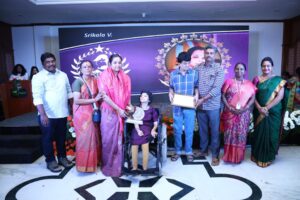
Srikala V
Srikala and her husband have two children with special needs – Naveen Kumar and Veena. Naveen is 17 years old and Veena is 13. Both live with cerebral palsy and intellectual disabilities. They are studying at the Spastic Society of Tamil Nadu, at Taramani, Chennai. Naveen was a very tiny baby who struggled to breathe. He was in the Neonatal Intensive Care Unit (NICU) for over 10 days. He had congenital rubella syndrome. The child was sickly and suffered a lot. “My husband’s friend advised us to admit our son to Madhuram Narayan Centre for Exceptional children at T Nagar, Chennai. It is here that we learnt how to support and manage him in a holistic way,” Srikala says. Naveen learnt to walk and the couple was thrilled. Their baby girl, Veena, born at this time started having problems too, and was shifted to the Neonatal Intensive Care Unit at G. Kuppuswamy Naidu Memorial Hospital, Coimbatore. Veena was diagnosed with communicating hydrocephalus. She had to have surgery at the Kanchi Kamakoti Child Trust Hospital, Nungambakkam after which she became well.
“Our focus shifted to Veena and we ended up neglecting Naveen,” Srikala says. In 2015 the children were admitted to the Spastic Society of Tamil Nadu Taramani. “After joining the Spastic Society we saw a lot of change in them. My son became more independent and confident. Veena too is on her way to recovery,” Srikala says. The children receive special education, physiotherapy, sensory integration and speech therapies. “Our children are our world,” says Srikala speaking for her husband. “Our plan is to do something for them and for other special children in our community.”
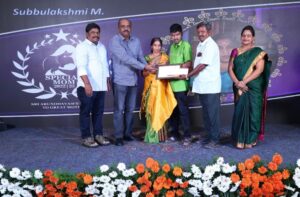
Subbulakshmi M
Subbulakshmi’s son, Keshavapechi Raju, was a caesarean baby. When he was 4 years old he was diagnosed with Nystagmus, a condition of rapid involuntary (or voluntary, in some cases) eye movement. This would lead to vision impairment. A MRI scan revealed that the child had Joubert Syndrome which affected his balance. He desperately needed therapy. Subbulakshmi ran a nursery/primary school and she took her son with her to school everyday. He attended all her classes and he made good progress. She later took him to Amar Seva Sangh for therapy and training and he made good progress there. “I quit my job and took my son to school every day because they said that his progress would be better if a parent accompanies him,” says Subbulakshmi. He got admission in the 1st Standard at Sivasaraswati Vidyalaya School and she attended all the classes with him. “I would come home and reinforce what they taught during the day,” she says.
She came to know about Special Education and competed Special Education Training (B.Ed.) in 2008. The association offered her a job at the school. “My son is learning Data Entry at Sangamam VTC as he was very interested in computers. Although he has many problems like low vision, ataxic cerebral palsy and intellectual disabilities we put him through many therapies and trainings. My husband is a huge comfort. He encourages me to be brave when we are made fun of.”
